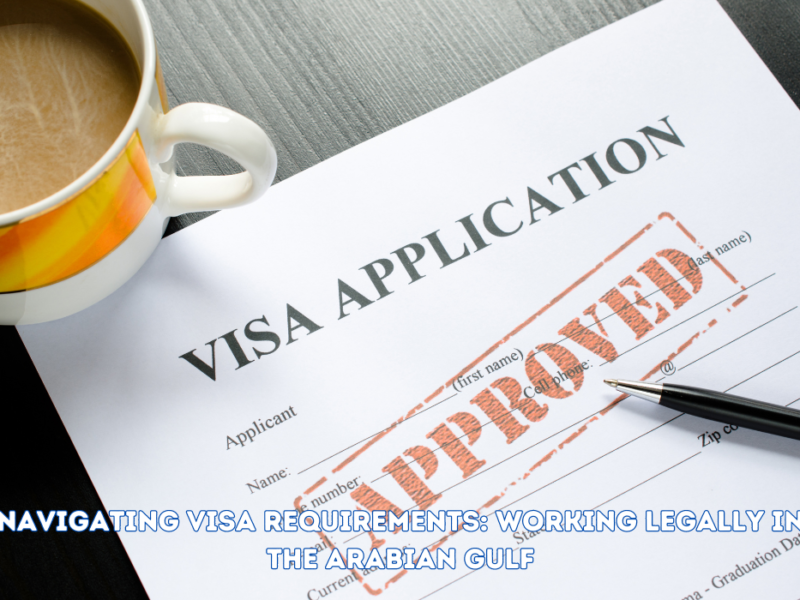Navigating through visa requirements is a crucial step for anyone planning to work in a foreign country. This process becomes even more critical when considering employment opportunities in the Arabian Gulf region. Understanding and complying with visa regulations is essential for securing legal employment and ensuring a smooth transition to working life in these countries.
Types of Work Visas
Temporary Work Visas
Temporary work visas are typically issued for a specific period, allowing individuals to work for a designated employer within a certain timeframe. These visas are suitable for short-term employment contracts or project-based work.
Permanent Work Visas
Permanent work visas, on the other hand, offer long-term residency and work rights in the host country. These visas are ideal for individuals seeking permanent employment opportunities and eventual settlement in the Arabian Gulf region.
Visa Requirements in the Arabian Gulf
Visa requirements vary among Gulf countries, each having its own set of regulations and procedures. Understanding the specific requirements of the country you intend to work in is crucial for a successful visa application process.
Eligibility Criteria
Education and Experience
Most Gulf countries require applicants to possess a minimum level of education and relevant work experience to qualify for a work visa. Academic qualifications and professional credentials are often evaluated to determine eligibility.
Sponsorship
In many cases, obtaining a work visa in the Arabian Gulf requires sponsorship from a local employer or company. The sponsoring entity serves as a guarantor for the applicant and is responsible for initiating and facilitating the visa application process.
Application Process
Required Documents
The application process typically involves submitting various documents, including but not limited to:
- Passport and visa application forms
- Passport-sized photographs
- Proof of employment or job offer
- Educational certificates and transcripts
- Medical examination reports
Submission Procedures
Applicants are required to follow specific submission procedures outlined by the respective immigration authorities. This may involve online application portals, in-person appointments, or submission through authorized visa processing centers.
Processing Time
Factors Affecting Processing
The processing time for work visas in the Arabian Gulf can vary depending on several factors, including:
- Volume of applications
- Completeness of documentation
- Clearance from relevant government agencies
- Seasonal fluctuations in demand
Expedited Processing Options
Some Gulf countries offer expedited processing options for urgent or priority cases, allowing applicants to receive their visas within a shorter timeframe for an additional fee.
Costs Involved
Visa Fees
Applicants are required to pay visa processing fees, which vary depending on the type of visa and the duration of stay. These fees are non-refundable and must be paid during the application process.
Additional Expenses
In addition to visa fees, applicants may incur additional expenses such as medical examinations, background checks, and translation services, depending on the specific requirements of the visa application.
Renewal and Extension
Renewal Process
Renewing a work visa in the Arabian Gulf typically involves submitting updated documentation to extend the validity of the visa. Renewal procedures may vary depending on the type of visa and the regulations of the host country.
Extension Procedures
In some cases, individuals may be eligible to extend their stay in the Arabian Gulf by applying for a visa extension. Extension procedures usually require demonstrating continued employment or valid reasons for prolonging the stay.
Legal Rights and Obligations
Rights of Foreign Workers
Foreign workers in the Arabian Gulf are entitled to certain rights and protections under local labor laws, including fair wages, safe working conditions, and access to healthcare and social benefits.
Compliance with Local Laws
It is essential for foreign workers to familiarize themselves with the legal framework governing employment in the Arabian Gulf and ensure compliance with all relevant laws and regulations.
Challenges and Solutions
Language Barriers
Language barriers can pose challenges for expatriates working in the Arabian Gulf, particularly in communication with colleagues, clients, and authorities. Learning the local language or relying on translation services can help overcome these challenges.
Cultural Adaptation
Adapting to the cultural norms and customs of the Arabian Gulf countries may require patience and open-mindedness. Building relationships with local colleagues and respecting cultural sensitivities can facilitate integration into the workplace and the community.
Employment Opportunities
Key Sectors Hiring Foreign Talent
The Arabian Gulf region offers employment opportunities across various sectors, including oil and gas, construction, hospitality, healthcare, and finance. Expatriates with specialized skills and expertise are in high demand in these industries.
Job Search Strategies
Effective job search strategies for expatriates include networking, utilizing online job portals, attending career fairs, and seeking assistance from recruitment agencies specializing in international placements.
Employer Responsibilities
Providing Support to Employees
Employers in the Arabian Gulf have a responsibility to support their foreign employees by providing adequate housing, healthcare, transportation, and other essential services. Clear communication and transparent policies contribute to a positive working environment.
Ensuring Compliance
Employers must ensure compliance with labor laws and regulations to avoid legal issues and penalties. This includes providing fair wages, adhering to working hour limits, and addressing grievances in a timely and appropriate manner.
Benefits of Working in the Arabian Gulf
Competitive Salaries
Employment opportunities in the Arabian Gulf often come with competitive salaries and attractive benefits packages, including tax-free income, housing allowances, healthcare coverage, and annual leave entitlements.
Career Growth Opportunities
The dynamic business environment and rapid economic growth in the Arabian Gulf present ample opportunities for career advancement and professional development. Expatriates can gain valuable experience and skills that enhance their long-term career prospects.
Cultural Considerations
Understanding Cultural Norms
Cultural sensitivity and awareness are essential for building successful relationships and navigating social interactions in the Arabian Gulf. Respect for local customs, traditions, and religious practices fosters mutual respect and harmony in the workplace and the community.
Building Relationships
Building strong relationships with colleagues, clients, and business partners is integral to success in the Arabian Gulf. Networking events, social gatherings, and community activities provide opportunities to connect with others and foster meaningful connections.
Conclusion
In conclusion, navigating visa requirements for working legally in the Arabian Gulf is a crucial step for expatriates seeking employment opportunities in the region. By understanding the various types of work visas, eligibility criteria, application procedures, and legal obligations, individuals can ensure a smooth transition to working life in the Arabian Gulf.
FAQs
- Can I work in the Arabian Gulf without a valid work visa? Working without a valid work visa in the Arabian Gulf is illegal and can result in serious consequences, including fines, deportation, and banning from re-entry.
- Are there any restrictions on the type of work I can do with a work visa in the Arabian Gulf? Work visas in the Arabian Gulf are typically issued for specific job roles or industries, and individuals are expected to adhere to the terms and conditions of their employment contract.
- How long does it take to process a work visa in the Arabian Gulf? The processing time for a work visa in the Arabian Gulf varies depending on various factors, including the country of application, the type of visa, and the volume of applications being processed.
- Can I sponsor my family members to join me in the Arabian Gulf on a dependent visa? Many Gulf countries allow expatriates to sponsor their family members for dependent visas, subject to certain eligibility criteria and documentation requirements.
- What should I do if my work visa is about to expire? It is essential to initiate the renewal or extension process well in advance of the expiry date to avoid any disruptions to your employment status in the Arabian Gulf.


Comments